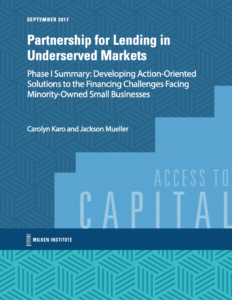 Partnership for Lending in Underserved Markets – Phase I Summary: Developing Action-Oriented Solutions to the Financing Challenges Facing Minority-Owned Small Businesses
Partnership for Lending in Underserved Markets – Phase I Summary: Developing Action-Oriented Solutions to the Financing Challenges Facing Minority-Owned Small Businesses
Milken Institute
First published September 2017
Starting a new firm or growing an established business requires capital, but Black and Hispanic businesses are reported to have higher barriers to capital access. The challenges are well documented and many solutions have been proposed, but to achieve change, we need to move ideas into action. The federal government actually has a lot of programs that can help. Between the Small Business Administration’s (SBA’s) Community Advantage Loan Program, Treasury’s Community Development Financial Institutions (CDFI) Fund), Commerce’s Minority Business Development Agency (MBDA), and the Department of Agriculture’s Office of Small and Disadvantaged Business Utilization(OSDBU), there is potential to mobilize resources that drive job creation and economic growth, especially in minority communities throughout the country. We need to leverage these resources, as well as develop and execute new solutions.
Building from a series of meetings with local stakeholders in June 2016 convened by the Milken Institute and the SBA’s Los Angeles regional office, the Milken Institute and the SBA convened a national roundtable at the White House to review the stubborn barriers to capital access that impede Black and Hispanic Americans from starting and growing their businesses. The aim of this roundtable was to discuss opportunities and develop a plan to overcome inhibiting hurdles. Representatives from financial institutions, regulatory agencies, community groups, research institutes, and others considered how to increase not only the number and value of loans to minority-owned businesses but also the number of successful (growing) minority-owned small businesses in Black and Hispanic communities employing Black and Hispanic workers.
That is why the Milken Institute and the SBA formed the Partnership for Lending in Underserved Markets (PLUM) initiative—a two-year pilot program to develop actionable solutions to address long-standing structural problems that inhibit minority-owned small businesses from accessing capital and growing their operations. The focus of this initiative is on classifiable small employer firms vs. non- employer firms (sole proprietors) that may generate income for an individual, but are less likely to make an economic impact in their communities as they do not create jobs and therefore do not achieve the multiplier effect of associated additional economic activity. Also, a deliberate commitment was made to acknowledge and pay attention to the different financing (and technical assistance) needs of start-ups vs. established firms.
Baltimore, Maryland, and Los Angeles, California were selected as the pilot cities. The Baltimore protests in the wake of the 2015 death of Freddie Gray while in police custody brought attention on a national level to the consequences of long-standing racial tension and community divestment. Los Angeles is a microcosm of racial and ethnic diversity with an instructive mix of overlapping jurisdictions and governance structures. Both cities have local-level actors with the will and infrastructure to activate good ideas.
Download Resource